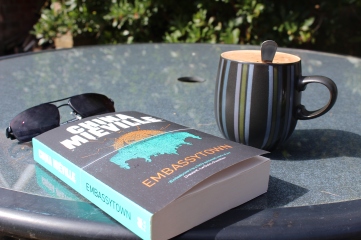Date finished: April 15th 2016
I always say that China Miéville’s talent is for coming up with concepts far beyond the imagination of any other author I’ve read. Embassytown is his most high-concept novel yet, a tour-de-force of dazzling invention and exploration.
The plot takes place, like all Miéville’s novels, in a city, the eponymous Embassytown, an outpost town on a distant planet, separated from other worlds by the Immer. A colony of various races reside in the city, running a conurbation built around the central embassy where the Ambassadors maintain a peaceful trade relationship with the native aliens, the Ariekei, commonly known as the Hosts. The Hosts have some interesting linguistic quirks: they speak from two mouths at once; their experience of Language, thought and reality are inseparable, meaning they are unable to lie; and they can only communicate with the Ambassadors – empathically-linked clones that, through their cognitive similarities, are able to speak with the same strange duplexity as the Hosts.
But into this happy little arrangement a new Ambassador arrives, and when they speak it changes absolutely everything, and could indeed threaten to tear Embassytown apart.
 For someone like me who studied linguistics at university, Embassytown‘s premise is a highly-compelling one. Miéville’s mind works on some other level to everyone else’s. He seems to accumulate a vast fount of knowledge on a given subject and say “What if I did [x] to fundamentally undermine all we know?!” and then he goes ahead and thoroughly blows your mind. Not only does he create incredible, new concepts, but he delves into their past, present, future and intricacies, in order to, in this case, deliver a backstory on the development of a made-up language so fascinating, realistic and impossible that you begin to wish it was real just so you could learn more.
For someone like me who studied linguistics at university, Embassytown‘s premise is a highly-compelling one. Miéville’s mind works on some other level to everyone else’s. He seems to accumulate a vast fount of knowledge on a given subject and say “What if I did [x] to fundamentally undermine all we know?!” and then he goes ahead and thoroughly blows your mind. Not only does he create incredible, new concepts, but he delves into their past, present, future and intricacies, in order to, in this case, deliver a backstory on the development of a made-up language so fascinating, realistic and impossible that you begin to wish it was real just so you could learn more.
Miéville’s novels are incomprehensible for a time and then suddenly, as he drip-feeds the information you need, you reach a point where it suddenly clicks, at which point your brain reels halfway across the room in shock. There are many authors who have managed to shock me before, to make me think differently about a subject or change my views or reevaluate my attitude towards something, but Miéville is the only author who can simultaneously send my brain into shutdown, make it burst with possibilities and still leave me thoroughly baffled. He’s an author that makes you crave more – not just of his own work, but that of others. Studying linguistics for three years made me feel like I never wanted to see anything to do with it ever again (as degrees do), but Embassytown has rekindled my interest with its playful inventiveness and searching attitude towards language.
It’s an expansive work, combining the intricacies of linguistics with highfalutin sci-fi conceptualisation; drug addiction with foreign policy; imperialism with identity, and then cramming further elements in until you wonder what else Miéville could possibly add. Sometimes this is at the expense of clarity, and there are places in which certain elements come out of the blue where Miéville has failed to concisely explain or emphasise a certain idea, having been too busy constructing his universe. It’s a petty concern in the scheme of things, but a noticeable one, nonetheless.
Logically then, Embassytown isn’t a holiday-read (depending on how challenging you like your holiday-reads to be). Miéville requires some work on the part of the reader who has to internalise and become fluent in his neologisms and pseudo-linguistics in order to be able to keep up, as well as keeping track of the various idiosyncrasies of a very-convincingly alien race, otherwise the experience will fall apart. The more I read Miéville, the more I think that re-reading his work may potentially be even more rewarding than the initial read – that’s the sort of density his books have.
Embassytown is a fantastically original piece of science-fiction, an ingeniously-conceived thought-experiment wrapped in a gripping sci-fi thriller, the daring invention of which would make such giants as Philip K Dick and Isaac Asimov tremble with envy. It’s not perfect – the sheer ambitiousness of it’s world-building and the density of the concept overwhelm to a degree that other aspects of the writing simply can’t compete. That’s not to say that they’re bad, but that they struggle to live up to the greatness of their world at times. They’re still pretty damn good regardless. Quite simply, this is one of the most enterprising works of science-fiction I’ve ever read; a perfect marriage of linguistic fervour and heady fantasy that’s sure to enrapture aficionados of the genre.
8/10
